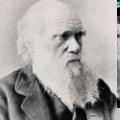February 12th is the 200th anniversary of the birth of Charles Darwin. Darwin was the English naturalist whose ideas on natural selection - on evolution - make him one of history's most influential scientists. The most familiar photograph shows Darwin as a stern old man with a long, white beard. But there's a lot more to Charles Darwin. Richard Milner is not your typical academic author. He has written about Darwin and studied his books and letters. But he also dresses up in 19th-century costume to become Charles Darwin in a one-man musical show he's written. And he's enthusiastic about the sweep of Darwin's life and work. "He's an explorer," says Milner. "He's a field collector. He climbed mountains. He rode horseback. He was an abolitionist who hated slavery. He talked to animals. He did geology, botany. He was a philosopher. He was a father of 10 children. Turned out hundreds of papers and books. Remarkably large man, large mind, large life." Darwin is best known as the father of evolution, the man who traveled the world on a British survey ship, the Beagle , taking notes and collecting specimens, then later introducing the world to the concept of natural selection - survival of the fittest, some call it. His book, On the Origin of Species , published 150 years ago, drew on his careful observations as the naturalist aboard the H.M.S. Beagle , especially as it skittered around the South American coastline.
"He collected thousands of specimens of rocks, fossils, insects, birds," Milner explains. "He excavated some giant sloth fossils in Patagonia and some glyptodon, which is a giant, extinct armadillo, and he realized - well, there are armadillos down there today. There are little small ones, and there are sloths there today, little small ones. But what's the connection between the ancient, large prehistoric animals and the modern ones? They must be related. He began to get the idea that all of life is related, and this is probably even more important than the idea of natural selection." Along the way, Darwin's careful observation and out-of-the-box thinking solved the mystery of how coral reefs were created. "He had a theory that the sea floor was sinking in certain places, and that these corals lived on the edges of underwater volcanoes, and as they continued to sink, the critters kept growing up towards the light very, very slowly. It took millions of years for these reefs to form. And that was his first scientific publication, the theory of coral reefs." His book on evolution, On the Origin of Species , came out more than 20 years after Darwin returned from his voyage on the Beagle , and there was widespread and often negative reaction to his upending of the widely held belief that plants and animals always had and always would look just as they looked now. "Well, at the beginning there was a great outcry," Milner says. "And of course, there were some very famous moments. A bishop's wife is said to have remarked" - and here Milner adopts her voice and tone our outrage - "'Descended from the apes? My dear, let us hope that it's not true. But if it is, let us hope that it does not become generally known to the public.'" Milner's one-man Darwin show features lots of music - song parodies that are less revolutionary than, shall we say, evolutionary. One song is about another scientist who properly should share credit with Darwin. "A younger naturalist, 14 years his junior, called Alfred Russel Wallace, working alone in the jungles of Malaysia, came up with exactly the same theory of natural selection and sent it to Darwin by post," Milner says. "It reached him and threw him into a tremendous panic. I wrote a song about it. He had a moment where he said, 'Oh, let him be first. I'd rather burn my whole book than let anybody think I stole anything from Wallace.'" Let him be first, there'll be no adulation. Let him inform the human race that it came down from the trees, And he can tell the bishops they are kin to chimpanzees That's one of the many songs Milner wrote to tell the story of Darwin and evolution, in his one-man show, Charles Darwin: Live and in Person . Milner's latest book, Darwin's Universe , is due out in May from the University of California Press. By Art Chimes Washington 06 February 2009

